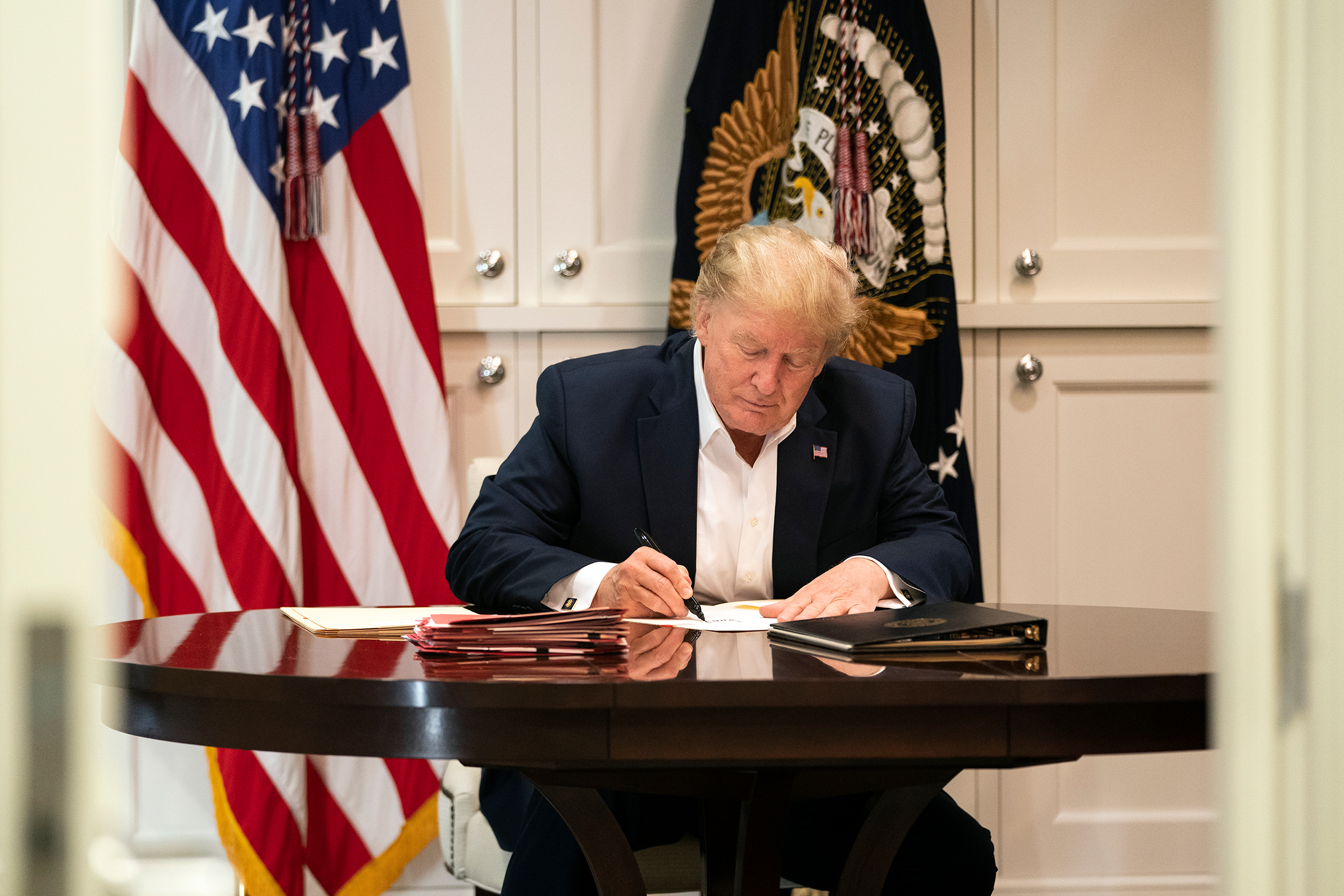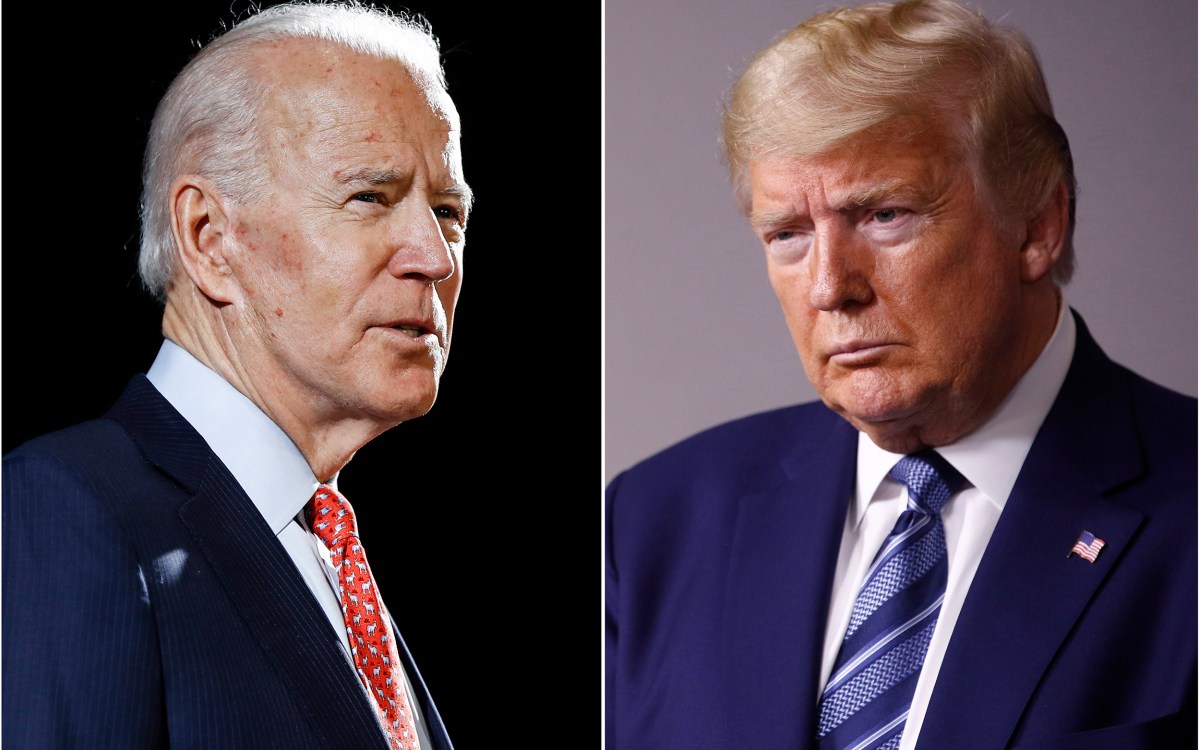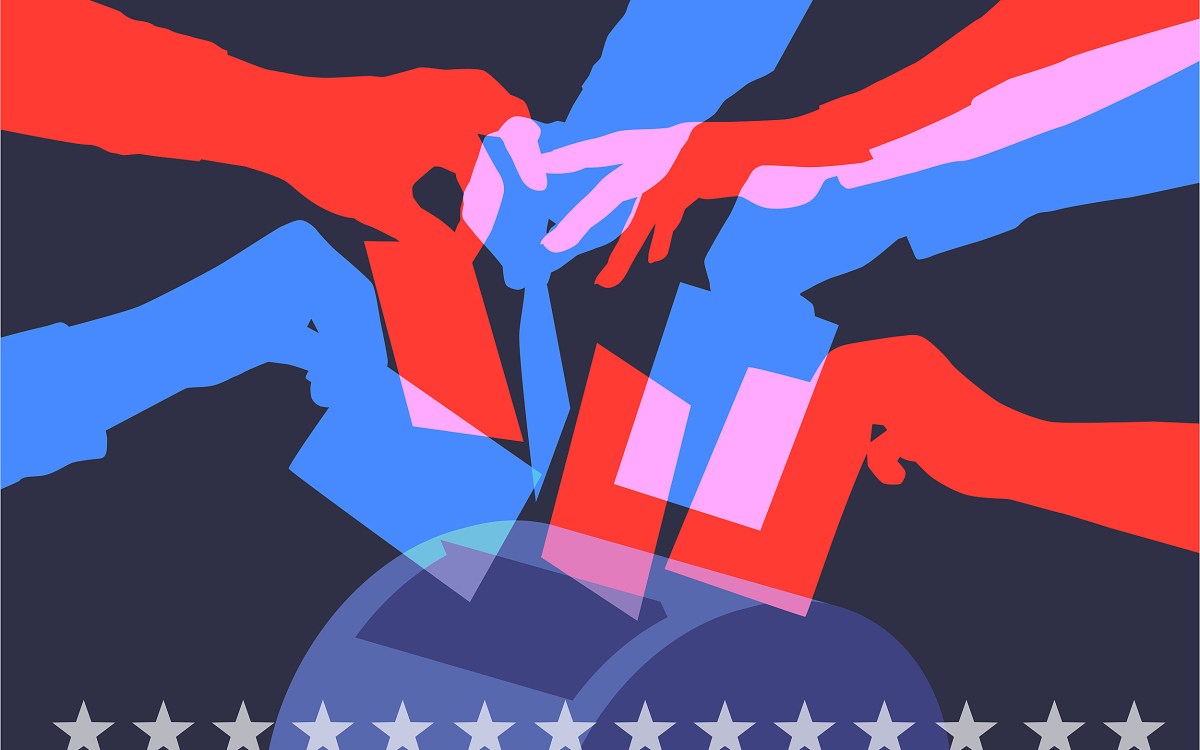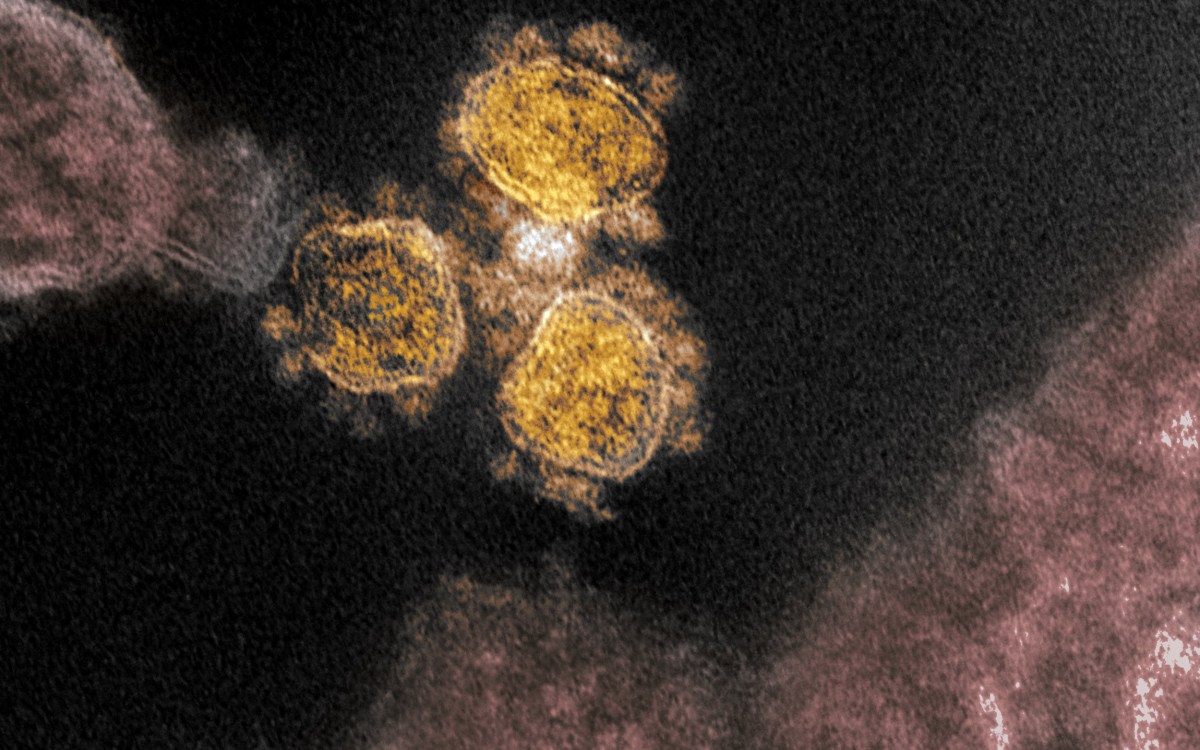
On Saturday, President Trump is shown working in the Presidential Suite at Walter Reed National Military Medical Center in Bethesda, Md.
Joyce N. Boghosian/The White House via AP
When COVID and the election collided
Medical, political analysts ponder Trump’s coronavirus battle, and what it means for the president and the nation
President Trump’s announcement Friday that he and his wife Melania had contracted the coronavirus sent shockwaves throughout the nation, with shivers rippling from the public health sector to the political landscape to the stock market.
News of the president’s illness came as the pandemic was gaining steam again in many states, including Massachusetts. In addition to the White House outbreak, a number of Washington officials and Trump allies who recently spent time together tested positive for the disease over the weekend.
With uncertainty now the norm, Harvard faculty members and others offered their views on key aspects of Trump’s illness and the fallout, including the prospects for his recovery, the effects on U.S. foreign policy, and the likely impact on the presidential campaign.
TRUMP’S ROAD AHEAD
Roger Shapiro
Associate professor of immunology and infectious diseases, Harvard T.H. Chan School of Public Health; associate professor of medicine, Harvard Medical School and Beth Israel Deaconess Medical Center
If this is a chance for an educational moment with regards to the pandemic, what would be the most important lesson?
We need to trust the science and remain vigilant about wearing masks and distancing. The virus doesn’t care who you are — it will win if we give it the chance.
What is the likely progression of the illness over the next two weeks?
In normal circumstances, up to 20 percent of people with COVID develop severe disease, and an obese man in his 70s would be at far greater risk. In people over 65, about 5 percent need hospitalization, and this continues to climb higher with age. ICU-level care is needed in about 20 to 30 percent of those hospitalized (again, even higher with older age). Since he received an experimental antibody treatment early in the course of his illness, this could improve his chances of remaining with a milder clinical course.
If he was your patient, what would be your advice?
Well, he won’t receive typical care. He’s already received an experimental antibody treatment, and he has been hospitalized for close monitoring. In a typical patient of his demographic, we would watch very closely with a low threshold for hospitalization if there were indication that his oxygen level (O2 saturation) was dropping.
Should we be concerned for the president’s life?
A typical obese man in his 70s would have a fatality risk of 10 to 30 percent. Whether the experimental antibody or other treatments he might receive will reduce this risk is unknown, but likely.
How are any of these answers different for the first lady, who is 50?
Her risk is far lower: 1 percent mortality or less.
IMPROVED TREATMENTS MAY AID RECOVERY
Barry Bloom
Joan and Jack Jacobson Research Professor of Public Health, former dean, Harvard T.H. Chan School of Public Health
How is the much-improved medical treatment of the disease since February likely to benefit the president?
First, physicians with experience following COVID-19 patients have learned a great deal about how to monitor that status of patients who have contracted COVID-19. There are multiple biological markers that indicate the seriousness of the biological changes caused by the virus infection, and that give hints about its possible progression or recovery. A significant number of lab tests for markers are used to measure inflammation, hypercoagulability, and organ damage — for example, to heart or liver.
There are a small number of new treatments that have had a positive impact in preventing progression to very serious conditions, including the antiviral drug Remdesivir, (which the president is taking), and the anti-inflammatory drug dexamethasone, that can prevent progression, improve outcomes, reduce the need for ventilation, and reduce mortality in many cases. What is interesting is that, according to the news, a combination of monoclonal antibodies that have been found to neutralize the virus — currently in clinical trials but I believe not FDA-approved — was given to the president. The goal here would be to block viral expansion and spread early in [the] infection and hopefully rapidly stop progression of the infection and disease.
CONCERN OVER SECURITY RISKS
Elizabeth Sherwood-Randall ’81
Deputy secretary, U.S. Department of Energy, 2014-2017; senior fellow, Belfer Center for Science and International Affairs, Harvard Kennedy School
How serious of a national security risk is it that the president and many trusted advisers have become ill at the same time? What is being done to protect the country while the Executive Office of the President is hobbled?
We know that adversaries may try to exploit a perceived moment of weakness at the top of the American government — adding to the myriad reasons the president and his team need to be transparent about his health. Established protocols must be promptly activated if the commander-in-chief is limited in his abilities to execute his duties.
In previous times, there has been a rigorous crisis-management process for making national security decisions, but that process has been weakened due to the current president’s capricious decision-making style. Nevertheless, there are experienced career civilian, diplomatic, and military leaders across the administration who continuously plan, prepare, and exercise for continuity of government. They bear a heavy responsibility to ensure our national security and the security of our allies at this unprecedented moment in our history.
THE TIME FRAME AND TESTING
Michael Mina
Assistant professor of epidemiology and of immunology and infectious diseases at the Harvard T.H. Chan School of Public Health and associate medical director in clinical microbiology in Brigham and Women’s Hospital’s Pathology Department. (Mina took media questions on the pandemic Friday afternoon.)
Is there a time frame for development of severe disease here?
It moves fairly quickly in a lot of people, but even two weeks from now it’s not crazy to think that he can deteriorate slowly … Hopefully they’ll be able to slow the virus (with remdesiver and other treatments), so that would give his immune system a chance to fight back. But if it doesn’t (fight back), that might slow it and he might have a delayed effect if his body doesn’t battle it off appropriately.
What do the positive test results say about the White House’s testing practices?
What I’ve seen in the media is that rapid tests aren’t working in the White House, but that’s completely false. If this was all of the people around Trump getting infected but testing positive and being isolated from infecting, Trump people would say, “Oh, it’s succeeding.” But Trump’s just another person, and by isolating him, by detecting it early in infection, this program is working. It’s stopping him from propagating the virus in the White House. What’s important here is testing will never stop somebody from getting the virus. To stop yourself from getting the virus, you need to not come in contact with the virus, or you need to protect yourself by wearing a mask if you do come in contact with the virus.
EFFECTS ON ELECTION UNCERTAIN
Dan Balz
Chief correspondent, The Washington Post; senior fellow, Institute of Politics at Harvard Kennedy School
With less than a month to go, how does the president’s diagnosis affect his campaign?
It’s premature to say just how this will affect 2020 … I would think that everyone wishes President Trump and first lady Melania Trump a swift and full recovery.
As for the campaign itself, nothing this year has really made a big difference in the state of the race. The president has trailed Vice President [Joe] Biden nationally for months, and the battlegrounds either currently favor Biden or are in the tossup category. The Trump campaign can continue its field and fundraising operations, as can the Biden campaign. The president’s absence from the campaign trail will be a negative for him, as he draws energy from the big crowds, but it’s not clear that any minds will be changed. Whether this will change the posture of the Trump team toward masks, social distancing, and the like is an important but so far unanswerable question.
One important fact is that this will continue to make the novel coronavirus front and center in the minds of people and therefore in the campaign.
LITTLE IMPACT ON CAMPAIGN
Alice Stewart
CNN and NPR contributor, senior communications adviser on four GOP presidential campaigns; 2020 & 2019 fall fellow, Institute of Politics at Harvard Kennedy School
With less than a month to go, how does the president’s diagnosis affect his campaign?
There are personal, immediate concerns for people that have been in the orbit who need to get tested and get checked. But, when you look at the political aspect, having talked with those on the campaign and then the RNC [Republican National Committee], the reality is even though the president will be in quarantine and will not be doing rallies, it should not have an impact on the campaign moving forward. His campaign is not only about rallies and not only about Donald Trump himself meeting with people. They have a tremendous and huge grassroots campaign. They have over 2.5 million trained volunteers who have been working to get out the vote, and that includes door-to-door canvassing, that includes phone calls, that includes social media engagement. The fact they have that infrastructure and that support in place will have a big impact on continuing to get the president’s message out there. And while the first priority is praying for the recovery of the president and first lady and others impacted, the campaign will continue to go on and has a solid and strong infrastructure to do so.
Trump supporters — not just on his campaign team or in the RNC, but people across the country — feel this campaign is not just about one man, but it’s about a large body of people who support this person because he supports them. That’s how they see this — as something that will energize people to stay engaged. Because right now, the president obviously cannot get out there for himself, so they will do some of the legwork for him until he’s able to.
Trump has said COVID-19 affects “virtually nobody,” and as recently as the night before his diagnosis said the pandemic’s end was “in sight.” Will this change how he and his campaign, and perhaps conservative media, talk about the pandemic or precautions like mask-wearing?
It would be hard to not do that. It would be hard to not put this back front and center as an issue on the campaign trail because, while the numbers did level off for a certain period of time, I still think it was important [to emphasize it]. It’s always important to remind people to wear masks and social distance and not just talk the talk, but walk the walk. And if nothing else, I do think this will motivate [Trump and the campaign] to do that, and to wear masks, and social distance.
It’s disingenuous to ignore the severity of coronavirus when you have it, just as it is disingenuous to stand in front of a burning building and say these are peaceful protests. So I think the pivot for the campaign is inevitable and important because, like it or not, the No. 1 issue for the American people has been health care and COVID for months. And while the campaign might not want to talk about it, it is front and center on people’s minds. If nothing else, this is a wake-up call to address the issue that is front and center on voters’ minds.








